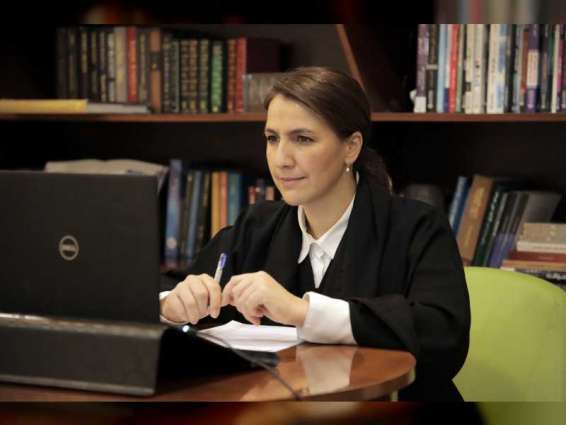DUBAI, (Pakistan Point News - 12th May, 2020) In the session entitled, "Implications of COVID-19 on the UAE: Risks and Opportunities", Mariam Hareb Almheiri, Minister of State for Food Security, confirmed that the UAE food security is maintained and its food system is capable of facing the potential challenges of the post-COVID-19 phase, highlighting that the current situation will change the world’s perspective on food security.
The session took place on the second day of the UAE Digital Government Meeting, "Preparations for the Post-COVID-19 Phase"; organised following the directives of His Highness Sheikh Mohammed bin Rashid Al Maktoum, Vice President, Prime Minister and Ruler of Dubai, to develop the UAE’s strategy for the post-COVID-19 phase.
Almheiri stressed that despite the challenges of coronavirus pandemic it also offers many opportunities for the food sector in the UAE, which proved to be highly equipped and resilient. "The UAE successfully secured food supplies in all the country’s markets, thanks to the efforts and cooperation of all stakeholders. Studies on the impact of coronavirus have highlighted that availing food products without securing an effective supply chain greatly affects the price of commodities, thus threatening consumers’ access to food supplies," she noted.
Almheiri hailed the UAE’s proactive approach manifested in adopting measures to promote food security, most notably launching the National Food Security Strategy in 2018, forming the Emirates Food Security Council in 2019, and adopting the Federal Law on the Regulation of the Strategic Stock of Food Commodities aiming to regulate strategic stock, achieve sustainability of the food security system, and develop plans to diversify main food import sources.
She pinpointed that the government worked on enhancing the readiness of the UAE customs centres to facilitate food trade, promote food security and provide all requirements needed to ensure food availability in all markets. It has further implemented mechanisms to enhance the capacity of plant and animal production at the national level, where producers are directly linked to markets and provided with public sector supply contracts, thus promoting the UAE’s position on the Global Food Security Index, GFSI.
Almheiri highlighted the main pillars of food security in the post-COVID-19 phase, including increasing local food production as a top priority, especially as the local production is of high quality, easily provided to local markets, and helps overcome imports challenges.
She added that in the post-COVID-19 phase, governments will focus on adopting modern agricultural technologies and utilizing renewable natural resources in food production.
The second pillar is providing a business-friendly environment that attracts foreign investments, as the coming period will witness increasing partnerships to launch investment incentives packages and promote agricultural and food projects that cater to the plans of increasing local production. The third pillar is developing various criteria for evaluating external agricultural investment opportunities, including the ease of product access to the markets of the investing countries and the commitment to external agricultural investment and product export. These projects aim to support the food security system in countries with limited natural resources, thus changing the external agricultural investment landscape.
"Strategic stock is a top priority," she said. "It demands to build and promote the strategic stock of goods on the country level rather than holding future partnerships to create a regional stock serving a specific consumption pattern." She further stressed the importance of involving the whole society in the food security discussions and raising awareness on the appropriate consumption behaviour and healthy diet to enhance individuals’ immunity systems and limit food waste.
The Minister pointed out that the post-COVID-19 phase presents an opportunity for supporting technology-enabled agricultural system, accelerating the transition from traditional to modern farming methods, enhancing food and water security, expanding local and international agricultural projects, increasing food production in the UAE through more than 40,000 farms, and raising local production by 100,000 tonnes to increase the strategic stock and ensure the availability of the main food products in all markets.
In addition to these measures, the next stage requires building strategic partnerships with countries and companies specialised in modern agriculture technologies, increasing food storage capacity and stores to reduce dependence on food imports, developing plans to enhance e-shopping of basic food products, conducting more research to achieve self-sufficiency and limit imports, in addition to conducting thorough checks on food supplies at airports, ports, and border crossings.
"Our wise leadership inspires us with high determination and we are well-positioned to become a knowledge role model. The UAE will work on projects to promote food security, such as e-shopping, plans to diversify food import sources, applying strict controls on food quality and security, and increasing exports to boost the UAE’s position as a global hub for food trade," AlMheiri said.
AlMheiri discussed the UAE plans aiming to lead regional and global efforts in using modern agriculture and water treatment and reuse technologies, especially as governments tend to expand and improve emergency food assistance and social security programs, develop innovative tools and solutions to facilitate access to food, maintain a balance between continuous production and workers’ protection, and stimulate the economy by increasing food production and exports.
During the Q&A session moderated by Dr. Amna Al Dahak Al Shamsi, official spokesperson of the UAE government and Assistant Under-Secretary for Care and Activities Sector at the Ministry of education, Almheiri answered several questions pertaining to regulating UAE investments to enhance food security, and the mechanisms for building new consumption behavior in a society focused on patterns that ensure the sustainability of food security.
Almheiri stressed that the UAE’s food security is resilient and that the food system is safe, effective and successful, thanks to the support and efforts of all stakeholders. She highlighted the national efforts to enhance technology-enabled food production to safeguard future food security.




